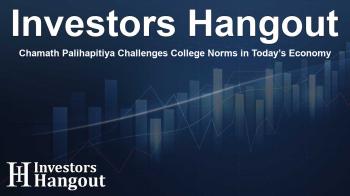Chamath Palihapitiya Challenges College Norms in Today’s Economy

Radical Shift in Educational Perspective
Chamath Palihapitiya, a notable venture capitalist, has made headlines recently for his evolving views on the value of college education. Once a proponent of higher education for cultural exposure, he now asserts that many young people are misled about their career paths. As student loan burdens reach staggering heights, Palihapitiya's perspective sparks an important conversation about education.
Skilled Trades Vs. Traditional Degrees
The Benefits of Trade Skills
During a recent appearance on the All-In Podcast, Palihapitiya expressed strong concerns about the educational narratives that have dominated for generations. He stated, "An entire generation was misled to believe attending university was mandatory." His comments reflect a growing belief that skilled trades can provide better financial returns than traditional college degrees.
Financial Outcomes Favoring Trades
In today's economy, skilled tradespeople can achieve impressive earnings. For example, a dual-income household with one member as a plumber and the other as an electrician can easily earn around $400,000 annually, all while avoiding crippling student debt — a stark contrast to the rising figures in the medical field.
The Impact of Federal Loan Policies
Rising Challenges for Medical Students
Palihapitiya's assertions come at a time when significant changes to federal student loan policies are emerging. These changes include new caps on borrowing for graduate and professional programs, which he believes could profoundly disrupt the traditional pathways that many aspiring doctors and other professionals had relied upon.
Responses from the Medical Community
The adjustments in federal lending practices have raised concerns among medical institutions and their students. Reports indicate that the cost of medical education often far exceeds these new limits, leaving aspiring doctors scrambling for alternatives. The Association of American Medical Colleges cites escalating costs for medical school, further complicating these issues.
The Rise of Alternative Education Models
Tech Leaders Weigh In
Amid these discussions, many influential figures within the tech industry are also questioning the viability of a college degree in today’s labor market. Mark Zuckerberg, CEO of Meta Platforms Inc., has suggested that the value of traditional degrees is diminishing, noting that many graduates find themselves in debt with uncertain job prospects upon conclusion of their studies.
Moving Towards Practical Learning
Similar sentiment is echoed by prominent entrepreneurs like Peter Thiel and Elon Musk, who have publicly advocated for alternative paths to education. As such, these discussions resonate beyond just financial outcomes; they highlight a potential shift towards practical, skill-based learning, prioritizing real-world applications over traditional credentials.
Student Debt Dynamics in the Modern Age
Current Trends in Student Debt
With the student loan delinquency rate rising sharply, policymakers and educators alike are reflecting on the consequences of these economic realities. Many young individuals are feeling the pressure of loan repayment, particularly in Light of new statistics indicating a high percentage of delinquencies among those under 30.
A Call for Refined Educational Strategies
The conversation surrounding education is no longer just about the value of a degree, but about effective strategies for achieving financial freedom without succumbing to overwhelming debt. The rise of skilled trades as viable career paths emphasizes the need for a reevaluation of the traditional education system.
Frequently Asked Questions
What is Chamath Palihapitiya's stance on college education?
Chamath Palihapitiya now believes that college education may not be essential, advocating for skilled trades as better routes to financial success.
Why does Palihapitiya promote skilled trades over college degrees?
He emphasizes that skilled trades often offer higher income without the significant burden of student debt, creating better financial outcomes.
How do recent federal loan changes affect aspiring professionals?
New regulations limit how much students can borrow for graduate and professional education, creating challenges for financing advanced degrees.
What are the consequences of rising student debt rates?
Higher delinquency rates signal growing stress among young borrowers, often leading to calls for a reevaluation of educational and financial systems.
Are tech leaders influencing educational models?
Yes, many tech leaders express doubts about the necessity of traditional degrees, encouraging practical skills and alternative learning methodologies.
About The Author
Contact Henry Turner privately here. Or send an email with ATTN: Henry Turner as the subject to contact@investorshangout.com.
About Investors Hangout
Investors Hangout is a leading online stock forum for financial discussion and learning, offering a wide range of free tools and resources. It draws in traders of all levels, who exchange market knowledge, investigate trading tactics, and keep an eye on industry developments in real time. Featuring financial articles, stock message boards, quotes, charts, company profiles, and live news updates. Through cooperative learning and a wealth of informational resources, it helps users from novices creating their first portfolios to experts honing their techniques. Join Investors Hangout today: https://investorshangout.com/
The content of this article is based on factual, publicly available information and does not represent legal, financial, or investment advice. Investors Hangout does not offer financial advice, and the author is not a licensed financial advisor. Consult a qualified advisor before making any financial or investment decisions based on this article. This article should not be considered advice to purchase, sell, or hold any securities or other investments. If any of the material provided here is inaccurate, please contact us for corrections.

